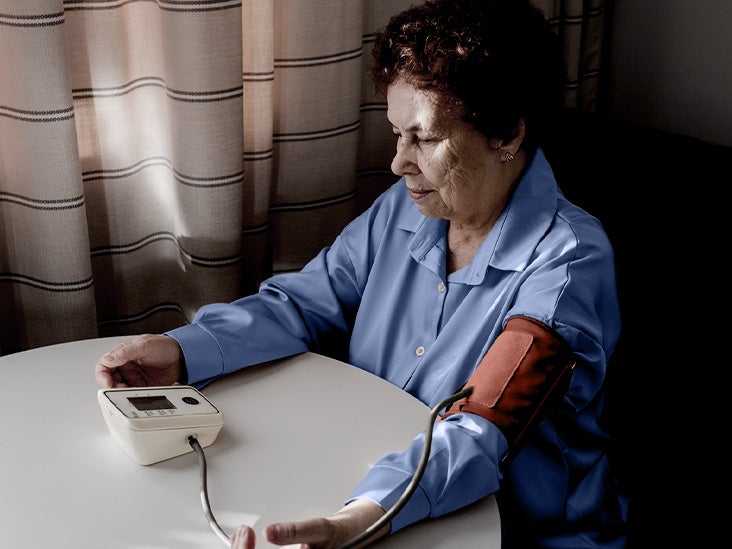Blood
High blood pressure in women: Symptoms, risks, and treatments
Symptoms of high blood pressure tend to manifest in the same way for both females and males. A person may develop chest pain, shortness of breath, and headaches if they have elevated blood pressure.
Doctors refer to high blood pressure as hypertension. This is the force the blood pushes against the artery walls. The amount of resistance or force will determine a person’s blood pressure.
This article looks at the symptoms of high blood pressure and whether there are any differences in females. It also explores high blood pressure in more detail, including its effects on the body, when to contact a doctor, and ways to treat or lower it naturally.
High blood pressure may cause no noticeable symptoms, so people can be asymptomatic but have a high blood pressure reading.
However, according to the World Health Organization (WHO), consistent high blood pressure may also cause the following symptoms in females and males:
High blood pressure may also cause:
What is high blood pressure?
The American College of Cardiology and the American Heart Association updated their guidelines for hypertension management. They defined hypertension as a blood pressure consistently at or above 120/80 millimeters of mercury (mm Hg). More severe forms of hypertension may reach a blood pressure at or above 140/90 mm Hg.
These measurements and the above symptoms indicate that a person requires medical attention and should consult a doctor.
Learn more about blood pressure ranges.
While the symptoms do not differ between females and males, the risk of high blood pressure does vary. A greater percentage of males, around 50%, have high blood pressure than females, around 44%.
Meanwhile, according to a 2022 review, the risk reverses gradually after the age of 50 years due to sex-specific factors. For example, hypertensive disorders of pregnancy such as preeclampsia, birth control, or the effects of menopause can affect high blood pressure.
If a pregnant person has a sharp rise in blood pressure, this may be a sign of preeclampsia. This is a potentially dangerous condition that can cause various symptoms and may affect the growth of the fetus.
Symptoms of high blood pressure a person may experience during pregnancy include:
All pregnant people should discuss their risk of preeclampsia, follow all guidelines, and attend appointments with their obstetrician.
Research from 2016 concluded that females were 35% more likely than males to be aware of their hypertensive status due to disparities in healthcare.
If a person displays symptoms of high blood pressure, they should contact a doctor to determine their reading. The symptoms of high blood pressure can be similar to other conditions, so it is important to consult a doctor to receive a suitable diagnosis and treatment.
If people do not have any symptoms, it can be difficult to detect high blood pressure. People can check their blood pressure at home, a doctor’s office, a pharmacy, or use pop-up machines in public spaces. Diagnosing hypertension is a quick and painless test of blood pressure.
Possible complications
If left untreated, hypertension may result in severe outcomes, such as:
Having elevated blood pressure for a short time may be a standard response when feeling stressed. Therefore, to safely diagnose hypertension, doctors will require several readings that show consistent high blood pressure over time.
It is important a person has their blood pressure checked regularly, even if they do not have symptoms, to rule out any health-related risks. Regular blood pressure monitoring may help prevent complications.
Adults should check their blood pressure at least once a year. Anyone over 40 years old has an elevated risk of high blood pressure.
Treatment for high blood pressure depends on the reading and risk of developing comorbid conditions.
People will usually need to take more than one type of medication to lower their blood pressure. Medications may include:
A person can discuss their medication with a doctor to check for any possible side effects. A medical professional may recommend a person take these medications in the long term to maintain their blood pressure levels.
Learn more about blood pressure medications.
In addition to medication for high blood pressure, several home remedies can help lower blood pressure naturally. A person can reduce their risk with modifiable risk factors, including:
Learn more about ways to naturally lower blood pressure.
Doctors diagnose high blood pressure when blood pressure readings are consistently high, at 120/80 mm Hg or above.
The condition usually causes males and females to experience the same symptoms, including headaches and effects on vision.
The difference between males and females is the elevated risk of high blood pressure, which increases with hormonal factors. For example, high blood pressure is more likely during pregnancy and menopause.
Doctors may recommend a combination of medications to manage a person’s blood pressure. People may also make necessary lifestyle changes to their diet and activity levels to maintain a standard blood pressure level.

